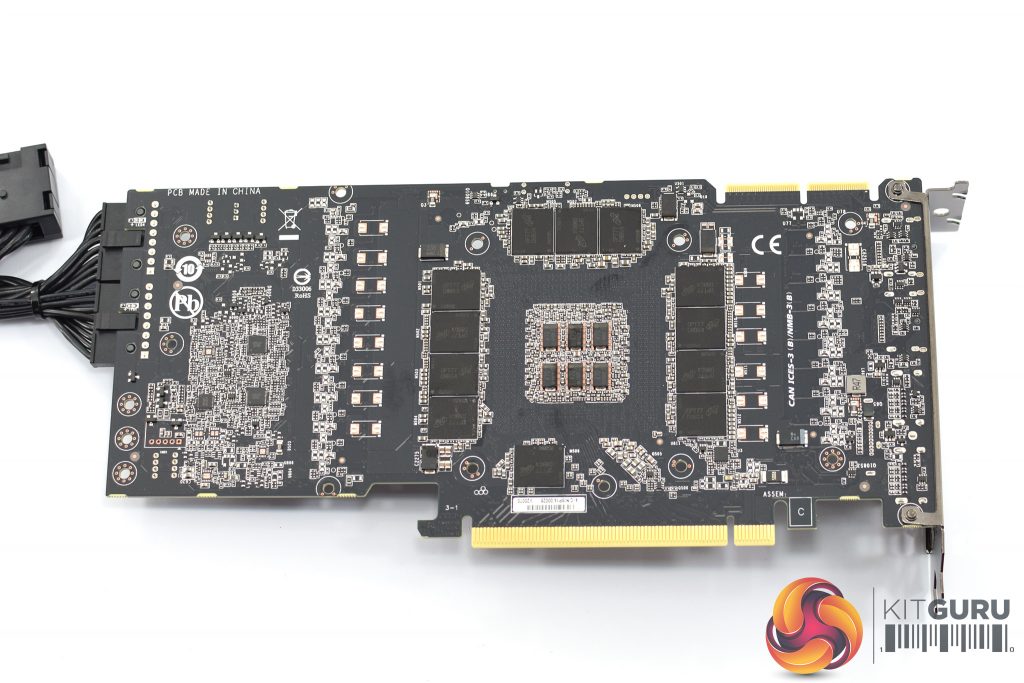There has been plenty of discussion surrounding the new RTX 3080 and RTX 3090 graphics cards, with suggestions that certain capacitors could be the cause of instability that some users have been experiencing. Gigabyte was one such manufacturer that used six SMD polymer capacitors (SP-CAPs) for its Eagle-series GPUs, with no multi-layer ceramic capacitors (MLCCs). The company has now issued a statement about its capacitors and component choices.
This morning, Gigabyte sent out a full statement regarding its RTX 3080/3090 graphics cards. We have copied this in full:
“In response to the recent reports speculating that the use of POSCAP capacitors on the GeForce RTX 3080/3090 graphics cards could lead to stability issues and crashes, we would like to clarify the issue with the following statement:
“It is false that POSCAP capacitors independently could cause a hardware crash. Whether a graphics card is stable or not requires a comprehensive evaluation of the overall circuit and power delivery design, not just the difference in capacitor types. POSCAPs and MLCCs have different characteristics and uses, thus it is not true to assert that one capacitor type is better than the other.
Gigabyte RTX 3090 Eagle OC
“The GIGABYTE GeForce RTX 30 graphics cards are designed in accordance with NVIDIA specifications, and have passed all required testing, thus the product quality is guaranteed. GIGABYTE GeForce RTX 3080/3090 GAMING OC and EAGLE OC series graphics cards use high-quality, low-ESR 470uF SP-CAP capacitors, which meet the specifications set by NVIDIA and provide a total capacity of 2820u in terms of GPU core power, higher than the industry’s average. The cost of SP-CAP capacitors is not lower than that of MLCCs. GIGABYTE values product integrity highly and definitely does not reduce costs by using cheap materials.
“NVIDIA has released a driver (version 456.55) on September 29, 2020 that improves stability. Users are advised to update to the latest driver for optimized performance. For users who encounter power-related issues with GIGABYTE GeForce RTX 30 series graphics cards, GIGABYTE will provide product replacement, free of charge.
“GIGABYTE has been constantly improving and optimizing product quality, especially in terms of thermal designs, to provide the best gaming experience to the consumers for decades. For the latest AORUS GeForce RTX 30 graphics card series, we have also paid extra attention to the cooling performance and introduced industry-leading solutions such as MAX-Covered Cooling to ensure that the operation of each component is stable.”
Chart provided by Gigabyte
This follows a brief statement from Nvidia alongside the release its 456.55 driver, which said:
“NVIDIA posted a driver this morning that improves stability. Regarding partner board designs, our partners regularly customize their designs and we work closely with them in the process. The appropriate number of POSCAP vs. MLCC groupings can vary depending on the design and is not necessarily indicative of quality.”
Discuss on our Facebook page HERE.
KitGuru says: I didn't experience any instability when testing either the RTX 3080 Eagle OC, or the RTX 3090 Eagle OC for my reviews. However, it seems a number of people were seeing crashes to desktop while using RTX 3080 cards. Gigabyte is clearly denying this instability is due to the use of SP-CAPs alone, and users who have experienced any crashes are advised to download Nvidia's latest 456.55 driver.
 KitGuru KitGuru.net – Tech News | Hardware News | Hardware Reviews | IOS | Mobile | Gaming | Graphics Cards
KitGuru KitGuru.net – Tech News | Hardware News | Hardware Reviews | IOS | Mobile | Gaming | Graphics Cards




